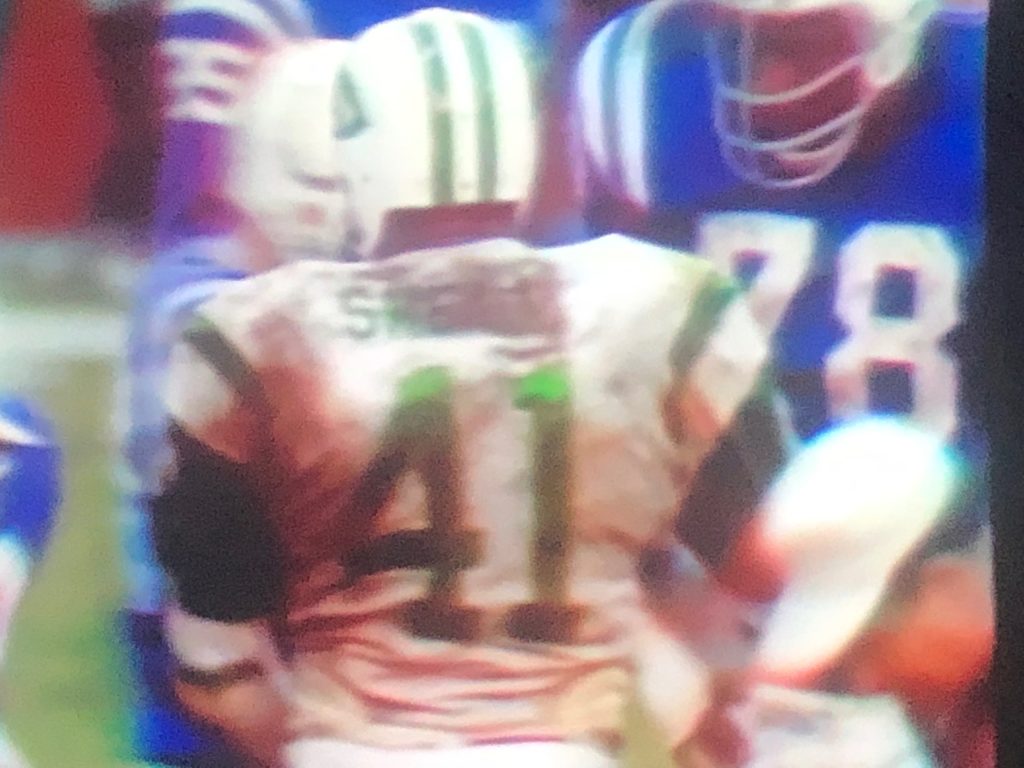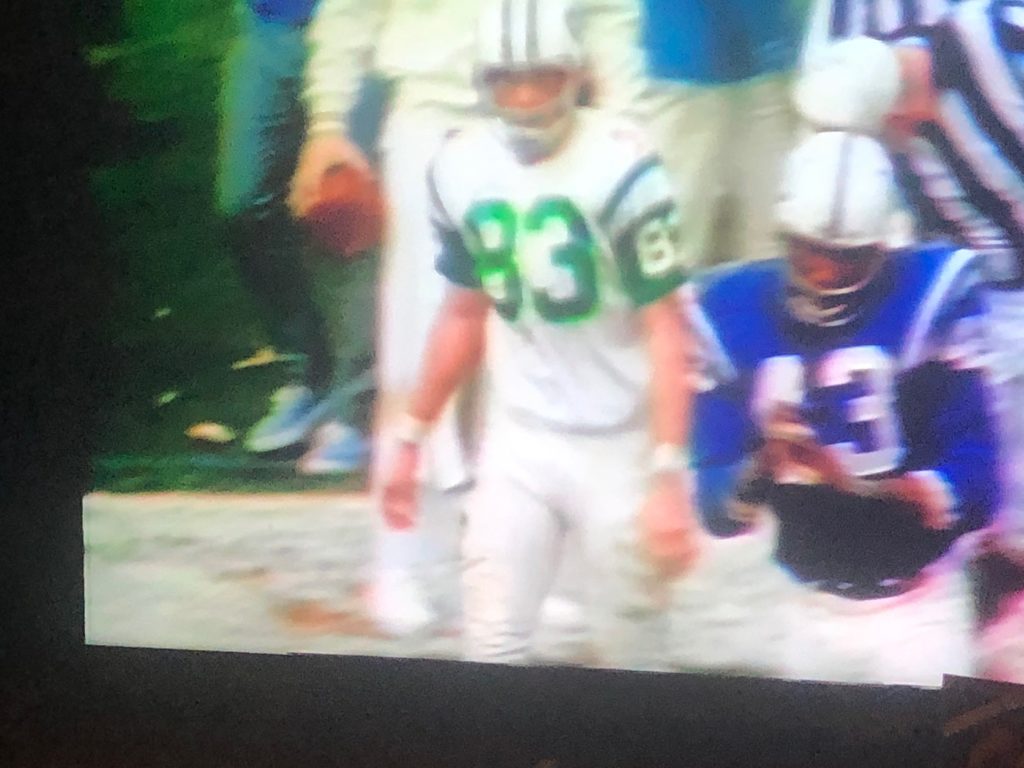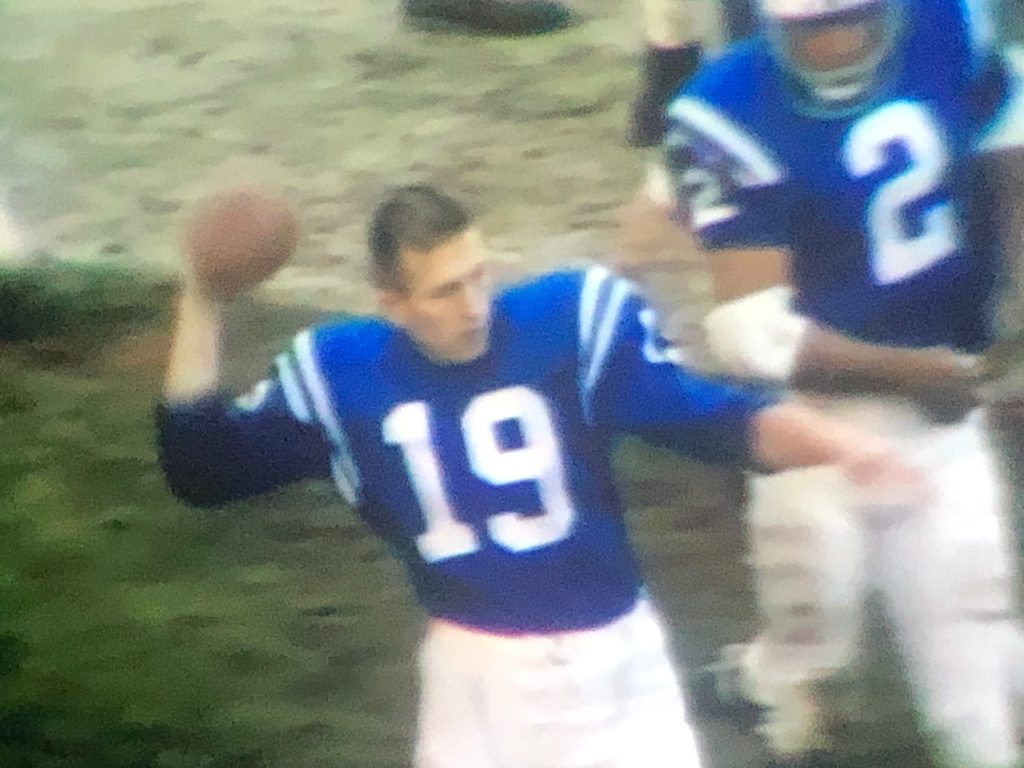When I first heard about the Internet, in the early 1990s—it was then described as the “Information Superhighway”—the only exciting application I could think of (I swear to God) was this: Maybe, through this series of tubes, I could witness Super Bowl III—the greatest upset in pro football history—not in the highlights I’d seen so many times, but rather in its entirety. In real time. In context.
Pro football had been my first genuine interest that had nothing to do with my parents. And I wanted to experience it as it came to folks—not as had been mythologized over the quarter century since.
It took a long time, actually, for the Internet to cough up Super Bowl III. Lotta porn, in the meantime.
But by now, I’ve seen Super Bowl III in its entirety maybe a half a dozen times, on YouTube.
And I’m watching it again tonight.
It continues to fascinate.
Why?
Because it’s beautiful in its way, even on a cloudy day. The muted, classic Colts’ NFL jerseys versus the Jets’ iridescent, upstart AFL jerseys that even the mud can’t mute!

And because now I can mythologize it myself.
Or de-mythologize it, more to the point.
***
The game starts as a stalemate. Which is an upset in itself, the Colts being favored by almost three touchdowns. The Colts have one early drive but it results in a missed field goal by Lou Michaels, a huge defensive lineman who did not enjoy the kicking part of the job. It made him nervous. “He worried about it a lot, he really did,” a teammate once said. “But he was good when we really needed it. If he missed one of those kicks, you didn’t want to be around him.”
The Jets’ George Sauer just fumbled the ball at the Jets’ 12. Sauer called football a “grotesque business” whose masters “mold you into someone easy to manipulate.” He later said, “My passion for the game was not sufficient. Football is an ambiguous sport, depending both on grace and violence. It both glorifies and destroys bodies. At the time, I could not reconcile the apparent inconsistency. I care even less about being a public person. You stick out too much, the world enlarges around you to dangerous proportions, and you are too evident to too many others. There is a vulnerability in this and, oddly enough, some guilt involved in standing out.”

Sauer retired early and went on to become a novelist, as obscure as a fella could ask for.
In any case, the Colts now have the ball at the Jets’ 14, at the end of the first quarter with the game in a scoreless tie. A moral victory on the scoreboard for the Jets, but their back is against the wall.
And on third down, Colts quarterback Earl Morrall throws a perfect strike at the goal line, but throws it too hard, it bounces off the receiver, and the Jets pick it off in the end zone. Jets’ ball at their own 20. The Colts’ frustration seems to really set in here, as the Jets begin a grinding drive.
A touchdown by fullback Matt Snell, who later refused to attend events celebrating the only title in Jets’ history, because of slights from the team that he never fully explained. “I don’t want anything to do with them,” he told a reporter six years ago, when he was 74.
The Jets lead, 7-0!
“Super Bowl, being brought to you in living color, exclusively on NBC,” says announcer Curt Gowdy, in the most enthusiastic comment he’s made thus far in a most surprising game.
Now the Colts are driving again, inside Jets’ territory. Maybe the inevitable is asserting itself, finally. But no, old Lou Michaels misses another field goal. (After football, he ran a tavern and served as an athletic director in a prison. His brother Walt was the Jets’ defensive coordinator during Super Bowl III. “People say, ‘Forget about it,'” Lou said before he died a few years ago. “How do you do that when your brother has your Super Bowl ring?”)
As the Jets take over, Gowdy enthuses, “This Super Bowl telecast is being seen in Mexico, English and French Canada, via satellite in Hawaii and Puerto Rico. Miami’s blacked out, and we’ve blacked out part of the British Empire.”
The Colts’ fullback Tom Matte gallops 58 yards to the Jets’ 16. Inevitability seems to reassert itself, even as we get deep into the second quarter. But then, the Jets’ Johnny Sample intercepts it at the Jets’ two-yard-line. Sample would go on to write a memoir called, Confessions of a Dirty Ballplayer, in which he said: “The white football establishment wants the black player to be thankful he’s out there on the field. That’s supposed to be some kind of privilege or a gift from the white fathers. But black players, just like white players, are out there giving their blood, sweat and tears, trying to earn a living and do a good job. That’s not a favor. That’s work.”
An exchange of punts, and now the Colts have the ball in Jets territory and they run a trick play and their best receiver is wide open and Morrall fails to see him and throws an interception. Morrall would live until 2014, but his descent, from chronic traumatic encephalopathy, was “horrific,” according to his son, who studied old game film to see how his dad might have been hurt: “One of the highlight films shows him scrambling out of the pocket. The first blow comes while going back to pass. One of the defensive linemen reached out and delivered a head slap. He spun out of that and he scrambled to the sideline and got horse-collared. He was about a yard out of bounds and someone came in and had helmet-to-helmet contact as he was going down. Dad dropped the ball on the ground, shook his head and went back in the huddle. That’s what happened in that era.”
Bob Hope is interviewed at halftime (of course) and is the first to say out loud that he’s “shocked by this game today, these Jets are doing something today, aren’t they?” Bob had flown into Miami with Baltimorean Spiro Agnew, the Vice President of the United States who would be forced to resign a couple years hence due to charges of tax evasion.
We begin the second half with the Jets leading 7-0. That margin was wider in those lower-scoring days that it sounds now. But obviously not out of reach for a Colts team that was favored by 18 points going in.
The Colts get the ball to start the second half, then immediately fumble the ball, giving it to the Jets around their own 30 yard line. Shit is getting real around here, and the legendary Johnny Unitas, injured all season with “torn muscles” in his throwing elbow, is warming up on the sidelines. (Later in life, he couldn’t pick up a fork with his right hand.)

The Jets’ Jim Turner makes a field goal, stretching the lead to 10-0, which feels like 20-0. By now in a modern game the announcers would have been talking in incessant superlatives about the unprecedented “narrative” that was beginning to unfold.
Turner makes another, and now it’s 13-0, late in the third quarter. Johnny Unitas enters the game. Around this time, Gowdy remarks on the significance of the game for the first time. “You may be watching one of the greatest games in sports history,” he says flatly.
At this stage in the broadcast, you can sense a little extra enthusiasm in the announcers, but not hear it in their words. The players, too, are quietly going about their business, like meter readers on a Monday. This stoicism has been nostalgically praised, by various jerks, including me. I once wrote: “Fans cheer and boo. Players play, and the joy of doing it should be joy enough.”
And as the fourth quarter dawns, the Jets have the ball on the Colts’ six-yard-line. Jim Turner kicks his third field goal of the game. A year later, he would be traded away, at his own suggestion. Jets’ coach Weeb Eubank “was very tight with money. You would think it was his money. You think you’re going to get a good raise, Super Bowl kicks and all and leading the league (in scoring). The offer was totally embarrassing and I said, ‘Get me out of here.'”
Unitas, now in the game, just threw an interception and this is starting to feel like the sinking of the Titanic.
After a time-consuming exchange of possession, the Colts score a touchdown with three minutes and nineteen seconds left in the game. That’s not going to be enough.
As the Colts prepare to kick off, Gowdy mentions that NBC will carry President Johnson’s “farewell State of the Union Message to Congress … the Colts are desperate, they’re trailing sixteen to seven, and just over three minutes left to play.”
An onside kick! The Colts recover! Now Unitas has them down to the Jets’ 25! To the 19! Fourth down. Incomplete. Jets take over. Still no sign of emotion from the Jets.
The ballgame ends, and we do not see the immortal shot of Namath—the rest of whose life would be an injury-filled, alcohol-soaked, embarrassment-pocked glide path to good-natured obscurity and Medicare Advantage ads—waving his index finger in terribly temporary victory.
***
Endless possibility is a major factor of the psychological motivation of the young, and early middle-aged: Dreams of glory.
As we get older, hope has to be consciously cultivated—channeled through our children, and their blue sky—and their children, eventually. “You’re gonna love being a grandparent.”
Focused on short-term travel plans. Hazily and hope-against-hopefully preoccupied with our “legacy.” Increasingly contemplating the approach of the ending, and the meaning of it all, amid the slowly gathering sadness.
I had an alcoholic aunt, who had seen things during her youth that no one should see. She was notorious in her social circles for clambering up on tables at cocktail parties and giving what was known by one and all as her “‘Life Is Shit’ Speech.”
That’s not the theme of my writing or the theme of my life. But I’m old enough to have seen a lot of promising lives fizzled out, and good lives end badly and to realize that Aunt Zodie, before she was carried out, did have a point.
Maybe “Turns to Shit,” is more like it.
I’m determined to enjoy the game while I’m playing. And when I’m happy, to show it.
Leave a Reply